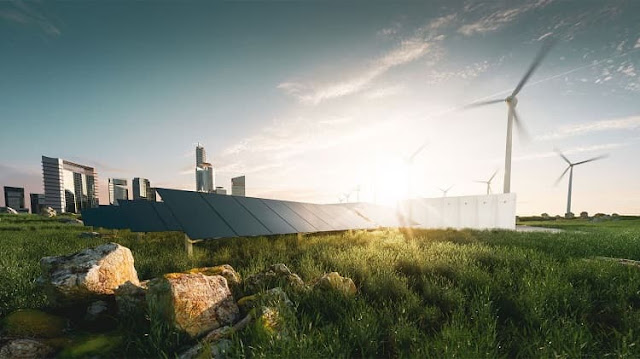 |
| Innovation in Energy BP's Alternative Pathways to a Greener Future |
In the wake of increasing global concerns regarding climate change and the necessity for sustainable energy solutions, traditional energy companies have faced mounting pressure to transition towards renewable sources.
One such company at the forefront of this transition is BP, formerly British Petroleum, which has undertaken significant efforts to diversify its energy portfolio beyond fossil fuels.
This article delves into BP's renewable energy initiatives, examining its strategies, investments, and contributions to the transition to a cleaner, more sustainable energy landscape.
A Shift in Focus
Founded over a century ago as an oil and gas giant, BP has undergone a profound transformation in recent years, epitomized by its "Beyond Petroleum" initiative launched in the early 2000s.
This strategic shift reflects BP's recognition of the finite nature of fossil fuels, coupled with mounting environmental concerns associated with their extraction and consumption.
Embracing the imperative for change, BP has embarked on a journey towards renewable energy, seeking to redefine its identity and secure a place in the emerging energy landscape.
Investments in Renewable Technologies
BP's commitment to renewable energy is evident in its substantial investments across various clean energy technologies. From solar and wind power to biofuels and hydrogen, BP has allocated significant resources to diversifying its energy portfolio. In recent years, the company has ramped up its investments in renewable energy projects, aiming to capitalize on the growing demand for clean and sustainable alternatives to fossil fuels.
Solar Power
One of BP's key ventures in the renewable energy sector is its involvement in solar power. Through its subsidiary BP Solar, the company has made strides in the development and deployment of solar photovoltaic (PV) technology.
BP Solar has been involved in numerous projects worldwide, ranging from utility-scale solar farms to residential rooftop installations. By leveraging its expertise in energy markets and technology innovation, BP aims to play a leading role in the global expansion of solar energy.
Wind Power
In addition to solar, BP has made significant investments in wind power, recognizing the vast potential of this renewable energy source.
The company has established wind farms in various regions, harnessing the power of wind to generate clean electricity.
With advancements in wind turbine technology and favorable regulatory frameworks, BP sees wind power as a cornerstone of its renewable energy portfolio, contributing to both environmental sustainability and business growth.
Biofuels
Another area of focus for BP's renewable energy initiatives is biofuels, which offer a promising alternative to conventional transportation fuels derived from fossil sources.
BP has been involved in research, development, and production of biofuels derived from biomass feedstocks such as agricultural residues, algae, and waste materials.
By investing in biofuel technology and infrastructure, BP aims to reduce carbon emissions from transportation and support the transition to a low-carbon economy.
Hydrogen
Hydrogen has emerged as a key enabler of the transition to a decarbonized energy system, offering a versatile and clean energy carrier.
Recognizing the potential of hydrogen as a zero-emission fuel, BP has been actively exploring its applications in various sectors, including transportation, industry, and power generation.
Through partnerships, pilot projects, and research initiatives, BP is advancing the development of hydrogen infrastructure and technologies, laying the groundwork for a hydrogen-powered future.
Partnerships and Collaborations
BP's efforts to accelerate the transition to renewable energy are bolstered by strategic partnerships and collaborations with governments, industry players, research institutions, and communities.
By leveraging collective expertise and resources, BP seeks to overcome barriers to renewable energy deployment and scale up clean energy solutions effectively.
Through initiatives like the Low Carbon Energy Exchange, BP fosters collaboration and knowledge sharing to drive innovation and progress towards a sustainable energy future.
Challenges and Opportunities
Despite its ambitious renewable energy initiatives, BP faces a myriad of challenges on the path to sustainability.
Economic uncertainties, policy fluctuations, technological limitations, and market dynamics pose significant hurdles to the widespread adoption of renewable energy solutions.
However, BP remains committed to overcoming these challenges, recognizing the immense opportunities presented by the transition to renewable energy, including enhanced resilience, reduced environmental impact, and long-term business viability.
Conclusion
As the world confronts the urgent need to mitigate climate change and accelerate the transition to renewable energy, companies like BP are playing a pivotal role in shaping the future of energy.
Through strategic investments, technological innovation, and collaborative partnerships, BP is actively contributing to the advancement of clean and sustainable energy solutions.
By embracing the principles of Beyond Petroleum, BP is not only redefining its own identity but also driving positive change towards a more sustainable and resilient energy future for generations to come.
Posting Komentar untuk "Innovation in Energy: BP's Alternative Pathways to a Greener Future"